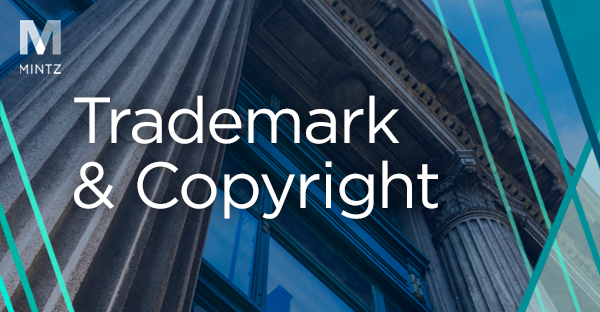
Trademark & Copyright
Viewpoints
Filter by:
Whose Profits Are These, Anyway? Who Constitutes The Defendant For Purposes of Disgorgement Of Profits In A Trademark Infringement Case
March 6, 2025 | Blog | By Laura Franco
Copying Westlaw Headnotes to Train AI Legal Search Competitor Is Not Fair Use, Per District of Delaware
February 20, 2025 | Blog | By Karen K. Won, Joe Rutkowski
Avoiding Pitfalls: IP “Dos and Don’ts” for High-Tech Start Ups
February 27, 2023 | Blog | By Daniel Weinger, Frank Gerratana, Greg Penoyer
Starting a high-tech company is a difficult, exhausting, and thrilling endeavor – one in which founders will face seemingly endless challenges, deadlines, and make or break decisions. From a venture’s inception, founders face numerous decisions that if not thoughtfully considered can result in significant legal and financial risk.
Lensa: Are AI Art Generators Copyright Infringers?
February 15, 2023 | Blog | By Frank Gerratana, Michael Graif, Sebastian Navarro
Artificial Intelligence (AI) is now at our fingertips. No longer a concept hidden behind the walls of Big Tech and academia, AI programs are now available and accessible to everyone. Generative AI tools like ChatGPT have made headlines for its human-like conversation and writing, and Lensa has done the same for its ability to create original works of art.
Year in Review: The Most Popular IP Posts of 2021
January 5, 2022 | Blog | By Christina Sperry
As 2022 begins and intellectual property (IP) strategies are being developed for the new year, it is a good time to reflect on what IP issues were prominent in 2021. According to many readers, hot topics included efficient and expeditious U.S. patent prosecution, new copyright and trademark laws, and standard essential patents (SEPs). Below are 5 of the most read IP Posts on Mintz.com from last year.
Read more
When Can a Trademark Owner Take Action for Unauthorized Use of its Trademark Online?
January 4, 2022 | Blog | By Susan Neuberger Weller
Unauthorized use of a trademark on the Internet occurs often and in many forms, usually involving the profiting, whether intentionally or unintentionally, from the goodwill associated with a trademark belonging to someone else. Such use, however, does not always rise to the level of trademark infringement. Unauthorized use of a trademark is only infringing if the particular use causes likely confusion among consumers. The most common type of confusion is confusion over source, which occurs at the time of purchase, but confusion can also arise as to affiliation, connection, or sponsorship, and confusion does not necessarily need to occur at the time of purchase.
Read more
The Trademark Modernization Act’s New Cancellation Procedures are Now Effective
December 28, 2021 | Blog | By Michael Graif
Is an unused registered trademark preventing you from clearing or registering your mark? Or was the blocking registration filed for goods or services that were not in use when the registrant declared that they were? The Trademark Modernization Act’s (“TMA”) new procedures for cancelling unused registrations, or registrations with goods and services that were not in use at the time of declaration, are now effective.
Read more
Quentin Tarantino’s Secret NFTs
December 8, 2021 | Blog | By Michael Graif, Frank Gerratana
Quentin Tarantino recently announced plans to auction off seven scenes from the 1994 motion picture Pulp Fiction as non-fungible tokens or NFTs. These “Tarantino NFTs” will include a collection of high-resolution digital scans of the original handwritten Pulp Fiction screenplay. The NFTs each contain scans of the uncut screenplay pages themselves that form a single scene from the movie. They will be auctioned on the NFT marketplace OpenSea and are built on the blockchain platform Secret Network, which launched in February 2020.
Read more
Second Circuit Provides Clarity on “Inherently Suspect” Standard, Overturns FTC’s Ruling on 1-800 Contacts Trademark Agreements
June 21, 2021 | Blog | By Evelyn French
On June 11, 2021, the U.S. Court of Appeals for the Second Circuit dismissed the Federal Trade Commission’s (FTC) administrative order against 1-800 Contacts, Inc. The Second Circuit found that the online retailer’s trademark settlements with competitor online contact lens sellers were not “inherently suspect” and, instead, should be evaluated under the traditional rule of reason analysis. The trademark settlements specified, among other things, that 1-800 Contacts’ competitors would not bid on the company’s name as a keyword in online search advertising. This ruling has significant implications for the “inherently suspect” standard—according to the Second Circuit, “courts do not have sufficient experience with this type of conduct to permit [the FTC’s] abbreviated analysis.”
Read more
Supreme Court to Consider When Inaccurate Information in a Copyright Registration Affects its Validity in Unicolors v. H&M
June 9, 2021 | Blog | By Michael Graif
After five years of litigation, the battle between Unicolors, a California-based fabric design company, and H&M is still going strong. Now the United States Supreme Court has agreed to decide whether an inaccuracy in Unicolors’ copyright registration invalidates its registration and thus a jury’s $1 million damages award in Unicolors’ favor.
Read more
How NFTs and Blockchain Secure Digital Sports Collectibles
May 24, 2021 | Blog | By Andrew D. Skale
Today, there are new opportunities to own a bit of sports history. It is now possible to even own a digital collectible of your favorite athlete making a play during a game. NFTs (non-fungible tokens) are being used to provide digital provenance that affords unique ownership of sports most memorable moments.
Read more
United States Supreme Court Rules for Google in a Landmark Fair Use Decision
April 6, 2021 | Blog | By Michael Graif, Matthew Hurley, Geoffrey Friedman
On April 5, 2021, the United States Supreme Court issued a significant fair use decision, holding six to two that Google’s copying of 11,500 lines of code from Oracle’s Java SE API in Google’s Android platform was a fair and transformative use.
Read more
The Trademark Modernization Act Establishes New Trademark Cancellation Procedures
January 12, 2021 | Blog | By Michael Graif, Williams Dixon
On December 27, 2020, the Trademark Modernization Act of 2020 (“the Act”) became law as part of the Consolidated Appropriations Act, 2021.
Read more
Congress Creates a Copyright Claims Board for Adjudication of Small Copyright Infringement Claims
January 5, 2021 | Blog | By Seth Davidson
Following up on our initial report last year on the possible creation of a Copyright Claims Board, we can now confirm the creation of that Board. The Consolidated Appropriations Act signed into law by President Trump on December 27, 2020 incorporates the CASE Act, establishes this new Copyright Claims Board (CCB) within the Copyright Office.
Read more
Protecting Lawful Streaming Act Signed Into Law
January 5, 2021 | Blog | By Seth Davidson
One of the provisions included in the Consolidated Appropriations Act that President Trump signed into law on December 27, 2020 addresses the so-called “felony streaming” loophole in the Copyright Act and criminal code.
Read more
FDA Issues New Guidance on Drug Naming
December 17, 2020 | Blog | By Karen K. Won
Last week, the Food and Drug Administration (“FDA”) issued a pair of Guidance for Industry documents outlining best practices for developing proprietary names (i.e. brand names) for prescription and nonprescription human drug products.
Read more
U.S. Trademark Office Issues Guide on How It Will Apply the Supreme Court’s Booking.com Decision to Examination of Relevant Applications
October 29, 2020 | Blog | By Susan Neuberger Weller
As we reported in our July 7, 2020 blog post on the USPTO v. Booking.com B.V decision, the U.S. Supreme Court ruled that a proposed mark consisting of the combination of a generic term and a generic top-level domain, like “.com,” is not automatically generic and can be protected as a trademark under certain circumstances.
Read more
SCOTUS Rules “Generic.com” Marks Are Eligible For Federal Trademark Protection
July 7, 2020 | Blog | By Susan Neuberger Weller
In a landmark decision, United States Patent and Trademark Office v. Booking.com B.V., the Supreme Court of the United States, by an 8-1 vote, affirmed the lower court’s determination that Booking.com could register BOOKING.COM as a trademark.
Read more
Second Circuit Declines to Decide if Human Skin Can Be a Tangible Medium of Expression under Copyright Law and Affirms Dismissal of Makeup Artist’s Lawsuit
June 22, 2020 | Blog | By Susan Neuberger Weller
In a recent decision from the Second Circuit, Judges Parker, Chin, and Carney side-stepped a novel question: whether human skin can be the kind of "tangible medium of expression" required for copyright protection. Instead, the court held that a photograph of a makeup artist’s application of a makeup design to a human “fixed” the design for purposes of copyright law and affirmed the district court’s dismissal of the appellant Mourabit’s unjust enrichment and unfair competition/misappropriation claims as preempted by the Copyright Act.
Read more
First Amendment May Protect Use of Trademarks As Artistic Expression
May 27, 2020 | Blog | By Susan Neuberger Weller
In a recent decision from the Southern District of New York, Judge George B. Daniels held that the strong First Amendment interests in protecting free artistic expression warranted summary judgment that Activision Blizzard’s use of Humvee vehicle models in the blockbuster Call of Duty videogames was not a violation of the Lanham Act.
Read more
Explore Other Viewpoints:
- Data Centers & Digital Infrastructure
- AI: The Washington Report
- Antitrust and Federal Regulation
- Appellate
- Arbitration, Mediation & Alternate Dispute Resolution
- Artificial Intelligence
- Awards
- Bankruptcy & Restructuring
- California Land Use
- Cannabis
- Class Action
- Complex Commercial Litigation
- Construction
- Consumer Product Safety
- Corporate Governance (ESG)
- Cross-Border Asset Recovery
- DEI Legal Developments
- Debt Financing
- Direct Investing (M&A)
- Diversity
- EB-5 Financing
- Education & Nonprofits
- Employment
- EnforceMintz
- Environmental (ESG)
- Environmental Enforcement Defense
- Environmental Law
- Environmental, Social, and Corporate Governance (ESG)
- FDA Regulatory
- False Claims Act
- Federal Circuit Appeals
- Financial Institution Litigation
- Government Law
- Growth Equity
- Health Care
- Health Care Compliance, Fraud and Abuse, & Regulatory Counseling
- Health Care Enforcement & Investigations
- Health Care Transactions
- Health Information Privacy & Security
- IP Due Diligence
- IPRs & Other Post Grant Proceedings
- Immigration
- Impacts of a New US Administration
- Insolvency & Creditor Rights Litigation
- Institutional Investor Class Action Recovery
- Insurance & Financial Services
- Insurance Consulting & Risk Management
- Insurance and Reinsurance Problem-Solving & Dispute Resolution
- Intellectual Property
- Investment Funds
- Israel
- Licensing & Technology Transactions
- Life Sciences
- Litigation & Investigations
- M&A Litigation
- ML Strategies
- Managed Care
- Medicare, Medicaid and Commercial Coverage & Reimbursement
- Mergers & Acquisitions
- Patent Litigation
- Patent Prosecution & Strategic Counseling
- Pharmacy Benefits and PBM Contracting
- Portfolio Companies
- Privacy & Cybersecurity
- Private Client
- Private Equity
- Pro Bono
- Probate & Fiduciary Litigation
- Products Liability & Complex Tort
- Projects & Infrastructure
- Public Finance
- Real Estate Litigation
- Real Estate Transactions
- Real Estate, Construction & Infrastructure
- Retail & Consumer Products
- Securities & Capital Markets
- Securities Litigation
- Social (ESG)
- Special Purpose Acquisition Company (SPACs)
- Sports & Entertainment
- State Attorneys General
- Strategic IP Monetization & Licensing
- Sustainable Energy & Infrastructure
- Tax
- Technology
- Technology, Communications & Media
- Technology, Communications & Media Litigation
- Trade Secrets
- Trademark & Copyright
- Trademark Litigation
- Unified Patent Court (UPC)
- Value-Based Care
- Venture Capital & Emerging Companies
- White Collar Defense & Government Investigations
- Women's Health and Technology






